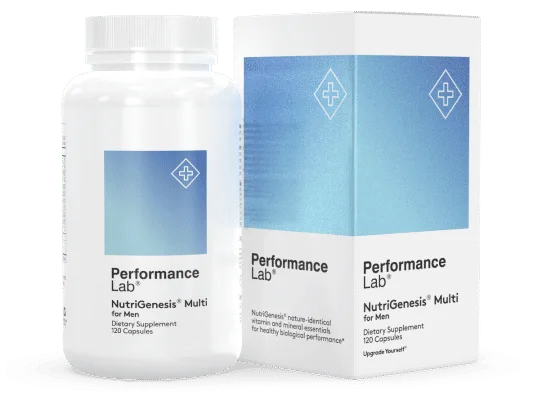“Are multivitamin supplements safe?” It’s a question that resonates with many, especially the half of American adults who routinely take a multivitamin.
Yes, they are generally safe and can supplement dietary gaps for certain nutrients.
However, like any vitamin and mineral supplement, the key lies in moderation and understanding your body’s unique needs.
Intrigued? Let’s delve into the fine print of this health habit.
Discover the power of Performance Lab NutriGenesis Multi – easy-to-swallow pills to get your daily essentials with ease! Get yours today and take your nutrition game to the next level.
Could Multivitamins Boost Your Health?
Multivitamins pack a nutritional punch by providing a wide array of essential vitamins and minerals.
Getting enough of nutrients like vitamins D, B12, and zinc is crucial for things like healthy bones, energy levels, and immune function.
Multivitamins can help fill in gaps when it’s tricky to get all your daily vitamin needs from food alone.
For instance, vitamin D isn’t abundant in many foods besides fatty fish and fortified milk.
For those at risk of vitamin D deficiency, like the elderly and people with dark skin, popping a vitamin supplement like Performance Lab D3+K2 alongside a multi makes sense.
Some research also hints that daily multivitamins may lower risk of chronic diseases like heart disease and cancer.
A major 11-year study in 14,000 male doctors found multivitamin users had modestly lower rates of total cancer and heart attacks [1].
But overall, study results on multis and disease prevention are mixed. While some show benefits, others show zippo effect. So the jury’s still out on whether multivitamin pills can really extend lifespan.
Do You Need Vitamin Insurance?
Whether you should take a daily multivitamin really depends on your unique situation and current diet:
- If you already eat a nutritious balanced diet with plenty of whole foods, you likely don’t require a multi. But for most healthy folks, a standard multivitamin is unlikely to cause harm either. It can provide a helpful nutritional safety net.
- Older adults, pregnant women, and people with conditions affecting nutrient absorption may benefit from a tailored vitamin regimen their doctor recommends. A customized multivitamin can help offset problems with digestion and absorption that become more common with age.
- Strict vegetarians and vegans may require supplemental vitamin B12, iron, zinc, calcium and vitamin D. A daily multi can provide these key nutrients often lacking in plant-based diets.
- Women trying to conceive should take a prenatal multi with 400-800 mcg of folic acid for at least one month before pregnancy. This vital B vitamin helps prevent neural tube birth defects.
In general, a standard daily multivitamin may provide a helpful nutritional safety net for those not getting sufficient nutrition from their regular diets. But it shouldn’t replace eating a varied, wholesome diet focused on whole foods.
Too Many Vitamins Can Backfire
For most healthy folks, multivitamins with standard doses are considered relatively safe. But popping too many pills may lead to trouble:
- Too much preformed vitamin A can cause liver damage, bone loss, and birth defects.
- High doses of vitamin E may increase bleeding risk and mortality.
- Megadoses of vitamin B6 above 200 mg daily could potentially cause nerve damage.
- Excess folic acid can mask a vitamin B12 deficiency, causing nerve damage over time.
The bottom line is to avoid taking any nutrients in clearly excessive amounts. Mega-dose supplements with sky-high vitamin levels can spell trouble. Don’t exceed the Tolerable Upper Intake Levels for vitamins and minerals.
Picking the Best Multivitamin for You
When scanning the supplement aisle, keep these tips in mind to find a quality multi:
- Seek varieties with 100% DV or less per nutrient.
- Ensure it has essentials like vitamins A, B, C, D, zinc, magnesium and selenium.
- Opt for trusted brands with rigorous quality testing, like Performance Lab NutriGenesis Multi.
- Ask your doctor for a recommendation based on your health needs.
- Skip labels with unsupported health claims.
With some savvy shopping, you can likely find a suitable daily multivitamin to fill potential gaps without going overboard. But don’t forget, a healthy lifestyle beats any supplement!
Natural or Synthetic – Which is Better?
You’ll see both natural and synthetic vitamin forms used in multivitamins. Synthetics are lab-created to mimic natural vitamins. Here’s a quick rundown on each type:
- Natural vitamins – Derived from food sources like fruits and vegetables. Considered more “bioavailable” for absorption. But can degrade more quickly.
- Synthetic vitamins – Manufactured in a lab to copy natural vitamins. More stable but may not be used by the body as efficiently.
Both forms have pros and cons. Many experts consider synthetics and naturals likely equal in benefit at equivalent doses. The most important thing is choosing a quality supplement from a reputable manufacturer. Pay more attention to the brand than whether vitamins are synthetic or natural.
How Do Multivitamins Interact With Medications?
Multivitamins may potentially interact with certain prescription medications. For example:
- Blood thinners – High doses of vitamin E and K can increase bleeding risks.
- Cholesterol drugs – Niacin, garlic and omega-3s may enhance effects of statins.
- Diabetes medications – Chromium and vitamin C may lower blood sugar too much.
- Antibiotics – Vitamin K production by gut bacteria may be disrupted.
- Levothyroxine – Calcium and iron can impair absorption of this thyroid med.
To avoid issues, it’s wise to consult your doctor about potential multivitamin interactions with your medications and medical conditions. They can help select an appropriate formula less likely to cause problems.
Do Men and Women Need Different Multivitamins?
Men and women can generally take the same daily multivitamin. But some gender differences in vitamin needs exist:
- Women may require higher doses of iron, folic acid, and calcium for menstruation, pregnancy prevention, and bone health.
- Men often need more zinc for prostate and testicular health, and possibly more B12, C, and D.
- Women over 50 should ensure adequate calcium, magnesium and vitamin D for bone density.
- Men over 50 may benefit from more B12 for energy and brain function as absorption declines with age.
So while a standard high-quality multivitamin is fine for most men and women, those with specific nutritional needs or health concerns may want to look for a more tailored formula.
Lifestyle Factors That Impact Multivitamin Needs
Certain lifestyle factors can alter your daily nutrient requirements and needs. Those who may benefit more from multivitamin use include:
- Smokers – Require extra vitamin C and E to counteract oxidative damage from cigarettes.
- Heavy drinkers – Need more B-vitamins depleted by alcohol consumption.
- Physically active – Have higher vitamin and mineral needs to replace losses from activity and sweating.
- Chronic stress – Taxes B-vitamin stores needed for energy metabolism and hormone production.
- Chronic dieting – Low-calorie intakes make it hard to get a full spectrum of micronutrients.
So if any of these factors apply, a standard daily multivitamin can help provide a nutritional buffer. But the healthiest move is still to adopt overall healthy lifestyle habits whenever possible.
Are Multivitamin Supplements Safe? – A Summary
At the end of the day, a balanced diet, activity, stress management, and adequate sleep form the real foundation for robust health.
But targeted vitamin regimens can help fill potential gaps for those who need it.
Just don’t assume more is better when it comes to vitamins! Moderation and balance is key.






Leave a Reply